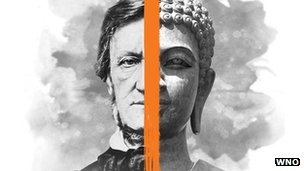BBC reports on May 10, 2013, that the opera ‘Wagner Dream’ links Wagner’s dying days in Venice with his interest in Buddhism.
The opera, written by composer Jonathan Harvey about Richard Wagner is to be partly performed in Pali, the 2,000-year-old language spoken by Buddha. In the production, a dying Wagner reflects on his own unfinished Buddhist opera.
According to author Urs App (Richard Wagner and Buddhism), it is little known that Richard Wagner was among the very first Westerners to appreciate Buddhism and that he was the first major European artist to be inspired by this religion. In 1856, in the prime of his creativity, the 33-year-old artist read his first book about Buddhism. Madly in love with Mathilde Wesendonck, a beautiful but happily married woman, he conceived two deeply connected opera projects: Tristan und Isolde which he went on to compose and stage, and Die Sieger (The Victors), an opera scenario based on an Indian Buddha legend translated from Sanskrit. These two projects mirrored Wagner’s burning desire for the consummation of his love and the necessity of renunciation.
This Buddhist opera project occupied Wagner’s mind for decades until his death in 1883. Indeed, the composer’s last words were about the Buddha figure of his scenario and his relationship with women.

Welsh National Opera (WNO) director David Pountney said the ancient Asian language was the most appropriate for the production. The original English text for the Buddhist characters has been translated by academics into Pali, while Wagner’s part is sung in German.
The British composer, who died in 2012, was keen for this to happen to “enhance and clarify the cultural dialogue” of the opera… and “brings together a giant of the Western musical tradition, Richard Wagner, with ideas and narrative elements from the Buddhist tradition,” Pountney said.
“We felt that the impact of this cultural dialogue would be enhanced by letting each of these two worlds speak in its own language rather than being confused by both being rendered in a third language, English.”
The Pali parts were translated by Professor Richard Gombrich, president of the Oxford Centre for Buddhist Studies, who said the task “brought some amusing challenges… in some places we had to split the musical notes in order for them to fit.“
Changes were also made to reflect the fact that pubs and tea – referenced in the English text – did not exist in ancient India. “I also felt obliged to insert, very briefly, some real Buddhist doctrine when the Buddha himself is speaking,” he added.
Wagner Dream will be staged at Wales Millennium Centre, Cardiff, on 6-7 June, with a performance in Birmingham on 12 June.




Comments are closed.